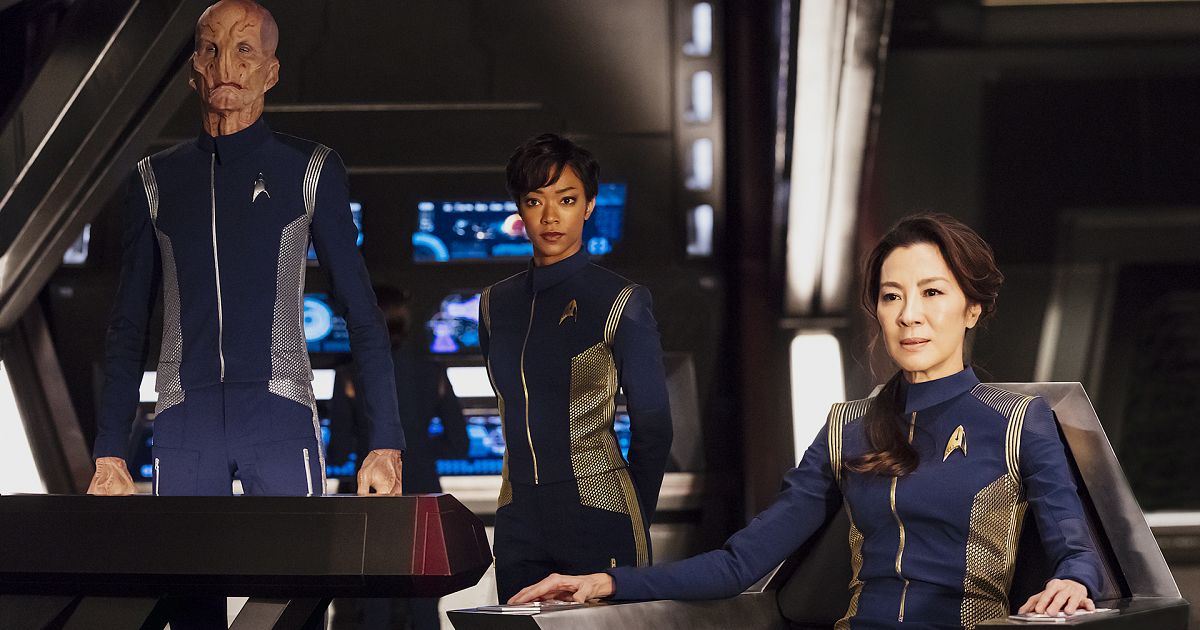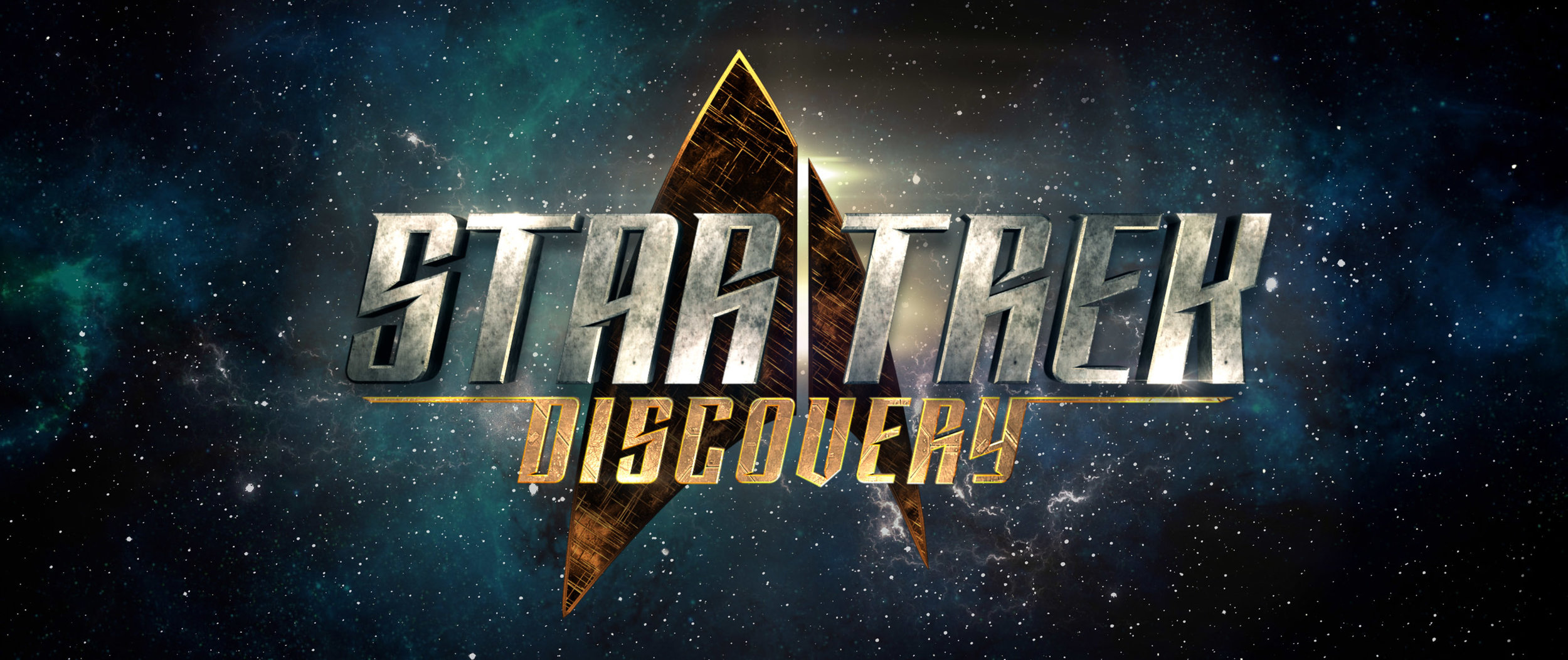"Discovery" is 21st Century Star Trek in every way
I've been a Trekkie for 26 years of my life, starting with the fifth season of Star Trek: The Next Generation, which means I became a fan during the franchise's "renaissance" if you will, when the original crew was on its way out with its final movie in 1991, and two new shows in Deep Space Nine and Voyager would be on their way within a few years. Enterprise, the prequel to The Original Series would come along to begin the 21st Century.
I like to think that each iteration of Star Trek is a product of the time it was created. When The Original Series first debuted in 1966, it was way ahead of its time and it was necessary for it to be that in light of the social climate. The Next Generation carried that torch into the early 90's and then things started to get "grayer" with Deep Space Nine in 1993 and Voyager in 1994. Television was getting edgier and grayer as well with what it was doing, as was society in general. Enterprise sought to renew old comforts from the first two series while still trying to respect the tone and nature of the last two, which might be why it only lasted four seasons.
To that end and tradition, Star Trek Discovery follows the paradigm to the letter. It is without question, Star Trek for a 21st Century audience and a show fit for 21st Century television. Gone are the days of 26 to 30 episodes a season with each being mostly self-contained and story arcs only carrying over in two to three parters. That's what television used to be. That's what Star Trek used to be.
Now, in a world of 8 to 13 episode per season dramas that tell one big story across the entirety of it with great complexity, the 51-year old franchise has once again changed with the times and delivered a show that at least in the beginning, is a compelling story about life, loss and the pursuit of vengeance. I know, depending on which Star Trek show you really like that might seem sacrilegious to you, but DS9 is my favorite so this is nothing new to me.
Without descending into spoilers here, I'll say that Discovery is centered around two important characters: Starfleet officer Michael Burnham, played by Sonequa Martin-Green and the Klingons, played by numerous actors, most notably T'Kuvma played by Chris Obi. To say that they have a checkered past together is putting it nicely and their interactions with each other set the groundwork for everything else that this show is looking to bring every week on CBS All-Access. Yes, if you didn't already know, this show is CBS' launch title on its standalone app, which sports a $5.99 a month fee ($9.99 for no commercials). You might resist the idea of going a la carte with your channels and having to pay for another app to watch your shows but let's face it, if you're a die-hard Trekkie you've at least got to try the 7-day free trial, right?
I can already see Star Trek purists hating this show for several reasons, not the least of which is that it looks and feels like Kelvin Timeline where the J.J. Abrams and Justin Lin reboot movies reside. Camera angles, ship design, uniform design, VFX in general and other details like pulse phaser blasts instead of beams and ship readouts don't scream "ten years before Kirk" at all. Not Prime Kirk anyway. The Starfleet and Klingon ships in Discovery look like they could tear apart an original Constitution Class starship with just one shot. In the show's defense, it's really tricky to do a prequel though since you're doing a show that is set hundreds of years in the future, but predates a show that also took place there but was made in 1966 with that era of VFX and technology. It's the same thing the reboot movies have to deal with, which is all the more reason why both are made for a new audience and not the die-hard fans that want to see crazy shadows and the push button click future with food slots and electronic clipboards for yeomen.
That's just the beginning of it, though. Discovery also fully embraces modern television structure and completely abandons what all other Star Trek shows have done in that sense. When Episode 1 "A Vulcan Hello" ends, it ends abruptly. In fact, it was so abrupt that it surprised me that it was over. It dangled off the cliff as much as it could before teasing you with the idea of letting go. No button on the episode, no nice and neat ending, and no message to relay to the viewer about the layers of what you have just seen. No, this is pure Game of Thrones/The Walking Dead/Marvel Netflix style episode ending, which is "we've run out of time for this week so if you want to see what happens next, you'd better be tuning in next week." When it works and the audience is invested, it's addictive and it's a staple of binge watching protocol, which will serve this show in good stead when the full season is done and people are ready to blast through it.
Finally, and this is a bit of a spoiler, it's not about exploration. It starts off that way and that is certainly Starfleet's intent in the beginning, but T'Kuvma and the Klingon Empire have other plans for the Federation. Violent and nasty plans, to boot. Think more DS9 with this one, guys. You definitely get a darker vibe with this show than one might think before watching it. It doesn't betray the show title at all, but it also doesn't feel like "five-year mission" stuff either.
Alright, time for the geeky stuff: They did their homework on the franchise for this show, in my opinion. When I first saw how tribal and statuesque they had made the Klingons in their complete redesign from ridges to weaponry, I wondered what else was going to change. It was awesome to see subtitled Klingon language for extended scenes and to hear the names Kahless and StoVoKor, as well as hear the "death scream" to warn the other side that a Klingon warrior is coming. I like the new-old look of the hand phasers and communicators, hearing references like General Order 1 (The Prime Directive) and T'Plana-Hath was awesome and the VFX is seriously on par with the reboot movies from what I can see. It's once again the best that Star Trek has ever looked. I loved the cinematography and direction as well.
Martin-Green's Michael Burnham intrigues me a lot. The idea of a human raised as a Vulcan has created this dynamic within her where she's logical in her problem solving and emotional in her resolution. It gets her into trouble very fast, but it will be fun to see how she deals with it. It was also great seeing Michelle Yeoh as Captain Georgiou, Doug Jones is once again unrecognizably cool as Lieutenant Saru, and it was refreshing to see James Frain as "not a villain" this time out as Sarek, Burnham's mentor and teacher on Vulcan. You wonder how long it will be before we see younger Spock on the show.
I'm a very open-minded Trekkie that loves seeing the franchise taken in new directions so I'm all on board with this one after the first two episodes. Like I said before, it will polarize the purist fans for certain and who knows how long it will last without them on board. This one might come down to how many subscribers CBS gets to the All-Access app as a result of it since there really aren't any "live numbers" to take from it in ratings, but I'm ready and open to see where the rest of this show goes with the understanding that it's not the old Star Trek at all, but rather a new one that fits the paradigm and standards of modern television. While that may bother a lot of longtime fans, it definitely won't bother me one bit.


